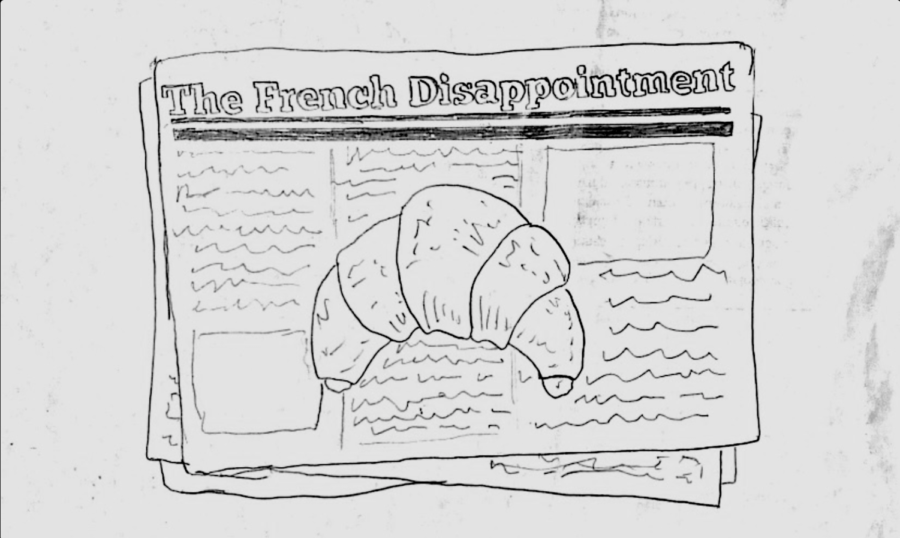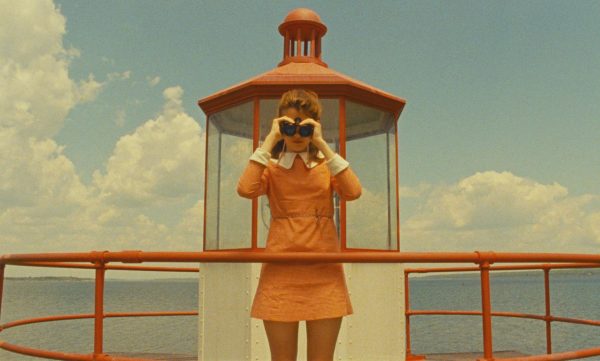The French Disappointment: A review of Anderson’s latest film
The French Dispatch is Wes Anderson’s love letter to journalists, but my love is not reciprocated
Wes Anderson’s latest film has gathered great critical acclaim, though I found it disorienting.
Sometimes you watch a movie and you do not want it to end. The French Dispatch was personally not one of those.
Wes Anderson’s latest film is told in vignettes, each representing a different article from the titular American publication’s French outpost. The magazine’s staff reminisces on some of their best pieces, prompted to re-print three in a final copy due to the untimely death of their editor-in-chief, played by the ever-Anderson-casted Bill Murray.
The stories are told as if the audience is reading The French Dispatch itself. There is an introduction, a transition, a story, a transition, and so forth. Along with this clever way of representing a publication, the movie often threw in journalism jargon in the in-betweens when the staff was editing their old pieces. At one point Bill Murrary’s character gets into an argument with another reporter about the best way to make the piece catch the viewers attention—with the lede. The whole film is a love letter to journalists, which of course would make me biased in this regard. I caught references some audience members might not get, which felt kind of meta and I loved it. Despite my inclination to be head-over-heels about the production, I could not help but feel it was missing something beyond the charisma.
Anderson is known for his tireless efforts to achieve perfection in symmetry and clandestine details in every corner, timing everything just right. The color-grading, the shot composition, the costumes, simply the overall aesthetic of all his films—specifically his latest—are almost incomparable. Not one detail is by accident. There was a shot in The French Dispatch that struck me with that realization, when a little pig trailed across the screen directly after Owen Wilson’s character crossed it. This is a particularly more insignificant example, yet the effort that actually goes into timing everything in a perfect sequential order, with so many moving parts, is astounding. For Anderson it is every small detail that adds up. However, no matter how much thought and time is put into style and face, aesthetic cannot make up for lack of substance or good storytelling.
Sometimes a lot is too much. As I sat in the theatre studying the screen, desperately scanning every part with my eyes, I felt myself losing track of what was happening. How could I possibly consume and process everything that was alluded to? Every minor plot that was going in a different direction? Of course, some movies are meant for several viewings. It is okay not to catch everything, perhaps preferable since it means your mind is expanding as you watch. Anderson does, admittedly, assume the intelligence of his audience. In this way, I feel his directorship and The French Dispatch deserve immense respect. My biggest pet peeve is when directors force-feed their audiences. However, the velocity that ideas were being thrown around truly felt to the extreme in this case. In each new vignette I had to readjust my mindset completely, the pacing being vastly different. The first story followed a mentally ill artist, locked away in an institution. This story was all about subtleties and moved at a walking pace. However, the vignette immediately following (Revision to a Manifesto) was chock-full of action and passion, war and blink-of-the-eye debates. It is difficult to get any enjoyment out of a movie, or for your mind to expand at all, when you do not even know what is happening. I found that I lost track of the plot somewhere around the second vignette. Though this may just speak to my intelligence, or lack thereof.
Put all this aside though, and my biggest critique still stands; There is no heart. Wes Anderson is not particularly known for compelling emotions in his catalogue, though I can say each I have seen has touched me in its own right. There has always been some sort of endearing quality to his movies that has served as a connection to the audience. In Moonrise Kingdom it was youth, innocence and coming-of-age love. In The Royal Tenenbaums it was family and devotion. In contrast, watching The French Dispatch felt like I was being held away at an arm’s length. Yes, there were some themes of love and a father-son relationship that consisted of sacrifice, but due to the nature of vignettes there was so little time to form any emotional connection to them. Even disregarding length, the stories do not attempt warmth in their given time-frame.
Nevertheless, I enjoyed the beauty. With everyday objects turned magical, this is romanticization at its finest. Typical Wes Anderson. His obsession with the past, with foreign items and nostalgia, is undoubtedly uniquely him. For this he deserves praise, because I will always believe that doing something new is of the highest significance. I still cannot help but let my pathos take over in my final decision on the film, which brings me to say that I am not a fan. However, I will be waiting for his next release. I am not turned off of him yet.














Brent • Mar 19, 2022 at 5:49 AM
100% agreed. I LOVE Wes Anderson films but this one lacked heart.
To be honest after act 1, I quit the movie. I was so underwhelmed.
And I see a lot of reviews saying the same. So sad. I was hoping from the previews of an intertwined story but seeing that it was separated threw me off. And yes I have a eye for black & white film.But It’s extremely hard to captivate an audience with that tactic over a long episode.
Leave the past in the past. We live in color. Wes above all should know not to test those waters because his entire aesthetic is based in amazing color palettes.
So disappointed.
I think his meta got too big.